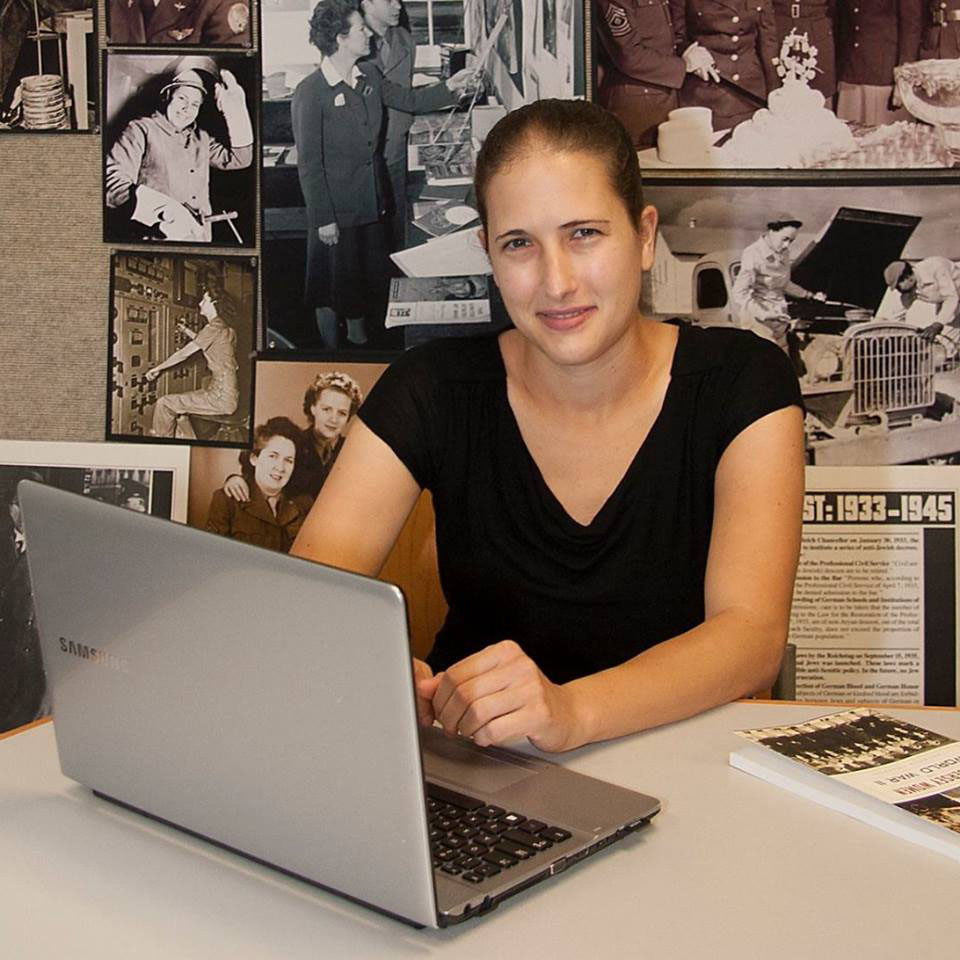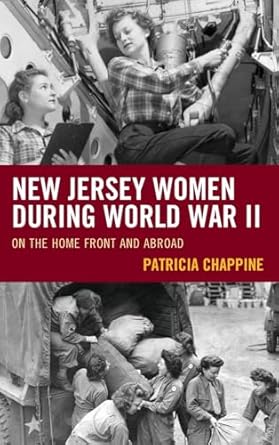Spotlight On: Patricia Chappine
Galloway, N.J. — Patricia Chappine, adjunct professor of Arts and Humanities and General Studies at Stockton University, was recently recognized with the 2025 New Jersey Studies Academic Alliance (NJSAA) Author Award for her book, "New Jersey Women during World War II: On the Home Front and Abroad."

In it, Chappine '06, '09, amplifies the often-underrepresented voices of women during World War II and how their stories of compassion, bravery and tireless ambition helped shape the war effort and life on the home front across the Garden State.
Chappine shared what inspired her research, the discoveries that surprised her most, and how she's helping a new generation of students uncover the stories that shaped New Jersey.
🏆 What does receiving the New Jersey Studies Academic Alliance (NJSAA) Author Award mean to you?
It was a wonderful surprise, and I was very excited to hear about the award. Mostly, I hope it showcases these stories to even more people and promotes a deeper understanding of the ways women in New Jersey contributed to the war effort.
💡 What inspired you to write "New Jersey Women during World War II"?
While I was in graduate school at Drew University, I began considering what I could write about for my thesis. I was always drawn to researching and writing about women's history and New Jersey history, particularly women's activism. Eventually, I started finding sources that dealt with New Jersey women during WWII in different online collections and in libraries and historical societies. As I kept reading through the primary sources and listening to oral histories, I was inspired by the way these women joined the war effort in various ways, from working in factories or serving in the military to volunteering for the USO or in civilian defense efforts. I realized that these stories should be showcased and connected to the national narrative of women during WWII.

Chappine’s book, "New Jersey Women during World War II: On the Home Front and Abroad."
🌟 Why did you feel it was important to highlight women's contributions from a New Jersey perspective?
I think it's important to recognize the contributions these women made to the war effort and the many ways they broke gender-based barriers in civilian employment and the military. In looking at the home front during WWII, especially, each state experienced the war effort differently. For instance, New Jersey's shoreline meant that communities along the coast were under dimout restrictions to prevent German U-boats from targeting U.S. ships in the Atlantic Ocean. Among other areas, Atlantic City was under dimout restrictions during the war and many local women vividly remembered this.
It's also important to consider the details of women's wartime experiences. While Rosie the Riveter is usually the image representative of women war workers, the reality of their experience was much more complex. Women inspected munitions, flew airplanes for the Army Air Forces, worked as engineers and codebreakers, trained pilots on early flight simulators, served as nurses on the home front and abroad and much more. The women of New Jersey were instrumental in the war effort, and I hope this book helps to bring their stories into public discussion.
🔍 Were there any surprising discoveries or stories that stood out during your research?
Atlantic City's transformation into "Camp Boardwalk" was an intriguing story and an understudied piece of local history. With the creation of the Thomas M. Engand General Hospital, military men received treatment and recovered with the help of local nurses, Red Cross volunteers, members of the Women's Army Corps and Navy WAVES and USO hostesses. Nurses played a major role in the recuperation and physical therapy of injured soldiers who came back to the home front to recover.
Follow your dreams and though there may be pitfalls along the way, you must just pick yourself up, dust yourself off and continue on your way.
Bee Falk Haydu, Women Air Force Service Pilots (WASP) member
Montclair, N.J.
With the recent movie “6888,” it's interesting to note that there were several women from New Jersey who were part of the Women's Army Corps Central Postal Battalion. There are just so many amazing stories with connections to local history.
📜 How do you hope readers will connect with this history today?
I hope readers will continue to make connections with the importance of local history and recognize the significance of New Jersey in other periods, as well. I also hope this inspires people to discover more about New Jersey women during WWII. There are so many wonderful resources available. Listening to oral histories and connecting individuals with the broad history was one of the main focuses of this book. So, I encourage anyone who is interested in learning more to listen to these stories. One wonderful resource I used in my research is the online oral history collection at the National Guard Militia Museum of New Jersey. The Veterans History Project at the Library of Congress was another important digital archive for this work.
✍️ How has your teaching at Stockton influenced your research or writing approach?
Teaching General Studies courses has helped me to look at research in an interdisciplinary way. Being able to connect with faculty, staff and students who also use research, writing and public history to bring historical narratives to the community continues to inspire this process. As a Stockton alumna, first as an undergraduate and then in the Master of Arts in Holocaust and Genocide Studies program, I still have the support of faculty who were mentors to me while I was a student.
It's also important to consider the details of women's wartime experiences. While Rosie the Riveter is usually the image representative of women war workers, the reality of their experience was much more complex. Women inspected munitions, flew airplanes for the Army Air Forces, worked as engineers and codebreakers, trained pilots on early flight simulators, served as nurses on the home front and abroad and much more. The women of New Jersey were instrumental in the war effort, and I hope this book helps to bring their stories into public discussion.Patricia Chappine, adjunct professor of Arts and Humanities and General Studies
🗺️ In what ways do you bring your historical research into the classroom or inspire your students to explore local stories?
I believe it's important to make connections between individual stories and broad historical narratives. In my research and writing, I use oral histories and written testimonies to highlight the nuances of these experiences. In my courses, I also incorporate individual narratives and encourage students to view our course topics through the lens of these personal stories.
In one of my courses, American Women during WWII, we explore the history of women on a national level while also including local narratives. For instance, we spend some time on Atlantic City during WWII, which was nicknamed "Camp Boardwalk" because the U.S Army converted major hotels into a training and redistribution area. Showcasing local history like this, especially with many students who grew up in the area, helps to make personal connections and inspire interest in continuing to tell these stories.
Taking this history outside the classroom, I'm collaborating with the Noyes Museum of Art to create a public exhibit that showcases the history of Atlantic City during WWII. This exhibit will be on display at the Noyes Arts Garage in Atlantic City in January 2026.
💬 What advice would you give to students interested in uncovering underrepresented voices in history?
I usually tell students to begin at Stockton's Bjork Library Special Collections, which has wonderful local history archives, some of which are even available online. The Atlantic City Free Public Library also has many interesting collections, both physical and digital. I also emphasize the importance of public history in showcasing underrepresented narratives. Physical and digital exhibits, online collections, oral history archives, and other projects help to bring these stories to the public. Sometimes, even talking to family members can provide a window into different periods of history and bring to light personal stories that form meaningful connections to history.
📖 What is currently on your Kindle or nightstand?
"Code Girls: The Untold Story of the American Women Code Breakers of World War II" by Liza Mundy.
Chappine received her bachelor's degree in Sociology in 2006, and her master's in Holocaust and Genocide Studies in 2009, both from Stockton, and also has master's and doctoral degrees in History and Culture from Drew University.
She works part-time as the Rudnick Fellow for the Alliance Heritage Center at Stockton.
Reported by Mandee McCullough
Photo submitted


